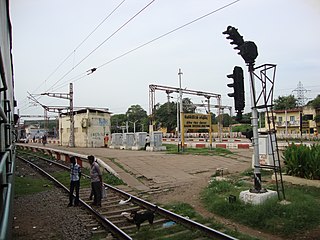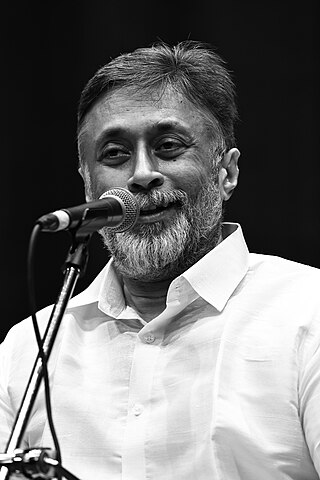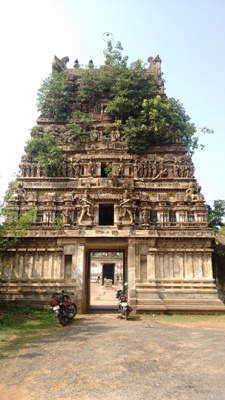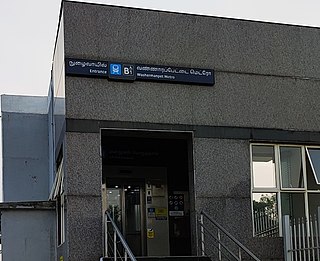Mint or The Mint may refer to:

Vinayagar Agaval is a devotional poetic hymn to the Hindu deity Ganesha. It was written in the 10th century during the Chola dynasty by the Tamil poet Avvaiyar, shortly before her death. It is considered to be her greatest poem. The 72-line 'Agaval' is a form of blank verse, close to speech.

The Tirumantiram or Thirumantiram is a Tamil poetic work, written either in the 2nd century BCE and 4th century CE by Tirumular. It is the tenth of the twelve volumes of the Tirumurai, the key texts of Shaiva Siddhanta and the first known Tamil work to use the term. The Tirumantiram is the earliest known exposition of the Shaiva Agamas in Tamil. It consists of over three thousand verses dealing with various aspects of spirituality, ethics and praise of Shiva. But it is more spiritual than religious and one can see the difference between Vedanta and Siddhanta from Tirumular's interpretation of the Mahavakyas. According to historian Venkatraman, the work covers almost every feature of the siddhar of the Tamils. According to another historian, Madhavan, the work stresses on the fundamentals of Siddha medicine and its healing powers. It deals with a wide array of subjects including astronomy and physical culture.

Basin Bridge Junction is a station on the Chennai Suburban Railway and serves the locality of Pulianthope & Moolakothalam, the confluence on the Otteri Nullah and Buckingham Canal, in Chennai, India. The station is located at the southern end of the 'diamond' junction in Chennai, where all the lines of the Chennai Suburban Railway meet. It is the first station after Chennai Central. At this station, the line divides into three: one going towards Avadi and Arakkonam, the other towards Ennore and Gummidipoondi, and the third towards Chennai Beach and Chennai Egmore. Thus, the station acts as the entry point to Chennai Central terminus where inbound trains from all the three lines are stopped before assigning a platform at Chennai Central. It also contains a railway maintenance shed with 19 pit-lines, each measuring 3-ft deep to accommodate about 24 coaches. The station has an elevation of 7 m above sea level.

Sanjay Subrahmanyan is a Carnatic musician and vocalist from Chennai, India. He was awarded the Madras Music Academy's Sangeetha Kalanidhi in 2015.
Nachimuthu Mahalingam was an Indian educationist, industrialist, philanthropist and prominent person in Tamil Nadu. He was the Chairman of the Sakthi Group and Chairman of Ethiraj College for Women between 1972 and 1980.
Vallalar Nagar is a neighbourhood in Chennai, India. Vallalar nagar is one of the important place in North Chennai. It is also called popularly as Mint, since the Madras treasury and mint was located here. The nearest railway station is Washermanpet railway station.
Thiruvarutprakasa Vallalār Chidambaram Ramalingam, also known as Vallalār, Ramalinga Swamigal and Ramalinga Adigal, was one of the known Tamil saints and a notable Tamil poet of the 19th century. He belongs to a line of Tamil saints known as "gnana siddhars".
Jyoti means "divine light" in many Indian languages.

Sathya Gnana Sabai is a temple constructed on 25 January 1872 by the saint Sri Raamalinga Swaamigal also known as Vallalaar in the town of Vadalur in Cuddalore district, Tamil Nadu, India. It is an octagonal structure; the sanctum sanctorum of this temple is concealed from the main hall by seven curtains which are parted only on the Thai Poosam day. All the four towers of the Chidambaram Nataraajar temple are visible from the sabha.

Vellore Corporation is a civic body that governs the city of Vellore, Tamil Nadu, India. Vellore corporation consist of 60 wards and is headed by a mayor who presides over a deputy mayor and 60 councillors who represent each wards in the city.
Kandaswami Temple is a Hindu temple dedicated to Murugan, located in the Parry's corner neighbourhood of Chennai city, in Tamil Nadu, India. It is also called 'Mutthu Kumāra Swāmi deva sthānam' and popularly known as Kandha kottam. It is managed by the Tamil Nadu Hindu religious and charitable endowments department of the government of Tamil Nadu. The Kandha kottam temple has associated educational institutions for music and dance classes; primary and high schools; and a college, in various locations. The Kandha kottam temple also performs social welfare initiatives like free medical clinics and free pharmacies.
Pudur is a locality in Chennai, Ambattur, which is a large neighbourhood in Chennai City.

Tiruvilanagar Uchiravaneswarar Temple is a Hindu temple located at Tiruvila Nagar in Mayiladuthurai district of Tamil Nadu, India. The presiding deity is Shiva. He is called as Uchira Vaneswarar. His consort is known as Veyuru Tholi Ammai.

Washermanpet is an underground metro station on the North-South Corridor of the Blue Line of Chennai Metro in Chennai, India. This station serves the neighbourhoods of Washermanpet and Royapuram.
Tirutthanigai Saravanaperumal Aiyar was a Tamil scholar, best known for his commentary on the Tirukkural and other Tamil classics.

Arutperunjothi is a 1971 Indian Tamil language devotional film based on the life of Ramalinga Swamigal directed by A. T. Krishnaswamy, starring Master Sridhar, A. P. Nagarajan, K. A. Thangavelu, M. Saroja, Devaki, T. S. Balaiah. It was released on 5 June 1971.
Thondaimandala Sadhagam is a 17th-century Tamil work of the type known as sadhagam. It was authored by Padikkaasu Pulavar. He was under the aegis of Muslim patron Seethakkadhi. The work deals with the folk events that happened in the ancient Tondaimandalam region of the modern Indian state of Tamil Nadu. The book is a compilation of information that are either obtained by first account or gathered by word of mouth and then compiled as poetry. The other works by the author include Thandalaiyar Sadhagam and Kongumandala Sadhagam.
Seven Wells is a neighbourhood in Chennai district of Tamil Nadu State in peninsular India. Its name was derived from the seven number of wells, dug out for clean drinking water and supplied to Fort, during the British period in Chennai. The seven wells were ordered to dig by Francis Whyte Ellis, an Englishman, who was an official of the East India Company, later became Collector of 'Madras'. Seven Wells constitute Seven Wells North [Seven Wells North is located at an altitude of 33 m above the mean sea level with the geographical coordinates of 13°06'11.5"N 80.16'53.8"E ] and Seven Wells South [Seven Wells South is located at an altitude of 33 m above the mean sea level with the geographical coordinates of 13°05'46.0"N 80°16'53.8"E ]. Out of the seven wells dug, only two are in use nowadays. This place was earlier called as Peddanaikenpet. Seven Wells is a crowded place of residents and businesses.








